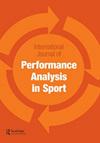Win or lose. Physical and physiological responses in paddle tennis competition according to the game result
IF 1.6
4区 教育学
Q1 Health Professions
International Journal of Performance Analysis in Sport
Pub Date : 2022-05-26
DOI:10.1080/24748668.2022.2082173
引用次数: 2
Abstract
ABSTRACT Sports success can be determined by technical level, physical condition, but also with behaviour and decision-making in competition. The main aim of this study was to compare the different physiological and physical responses of professional male paddle-tennis players as a function of the game result. Sixty sets and twenty-four players were analysed in the Spanish National Championships. Heart rate (HR), lactate concentrations, rating of perceived exertion (RPE), covered distance and speed and sprints were measured. Comparative tests were performed to compare winners and losers, and RPE was analysed using the Receiver Operating Characteristic (ROC) curve test through Logit model. Losers showed greater results in the mean HR (154.1±15.6 beats·min−1) than winners (144.2±19.1 beats·min−1, p<0.01). A score of 6–10 or 16–20 points in RPE, entailed a high or low probability of winning the set (72–92% or 6–23%, respectively). Physical responses were higher in losers, e.g. higher distances, mean velocity, sprints number between 2.1–9.0 km·h−1. As conclusions, players who finally lose the match demand greater physical and physiological responses in general. It is established, as in other racket sports, that the player’s position on the court is key to determining victory in this sport.赢或输。根据比赛结果对球拍网球比赛的生理反应
体育运动的成功既取决于技术水平、身体状况,也取决于比赛中的行为和决策。本研究的主要目的是比较职业男子球拍网球运动员不同的生理和身体反应与比赛结果的关系。对西班牙全国锦标赛的60盘24名选手进行了分析。测量心率(HR)、乳酸浓度、感知运动等级(RPE)、覆盖距离、速度和冲刺。对优胜者和败者进行比较检验,通过Logit模型采用受试者工作特征(ROC)曲线检验分析RPE。失败者平均心率(154.1±15.6 beats·min - 1)高于优胜者(144.2±19.1 beats·min - 1, p<0.01)。在RPE中,如果得分为6-10分或16-20分,则获胜的概率为高或低(分别为72-92%或6-23%)。失败者的身体反应更高,如距离、平均速度、冲刺次数在2.1-9.0 km·h−1之间。总的来说,最终输掉比赛的球员需要更大的身体和生理反应。与其他球拍运动一样,运动员在球场上的位置是决定这项运动胜利的关键。
本文章由计算机程序翻译,如有差异,请以英文原文为准。
求助全文
约1分钟内获得全文
求助全文
来源期刊

International Journal of Performance Analysis in Sport
SPORT SCIENCES-
CiteScore
4.70
自引率
4.80%
发文量
38
审稿时长
>12 weeks
期刊介绍:
The International Journal of Performance Analysis in Sport aims to present current original research into sports performance. In so doing, the journal contributes to our general knowledge of sports performance making findings available to a wide audience of academics and practitioners.
 求助内容:
求助内容: 应助结果提醒方式:
应助结果提醒方式:


